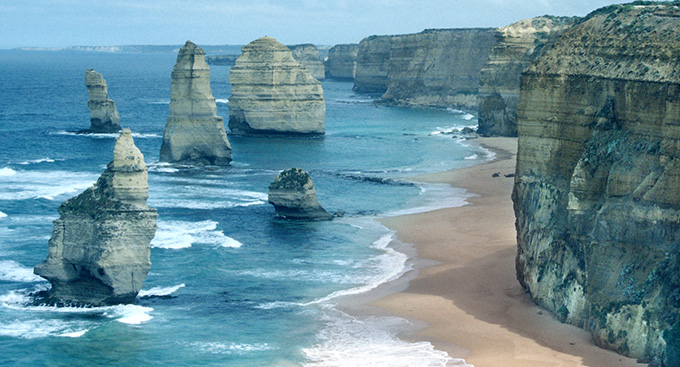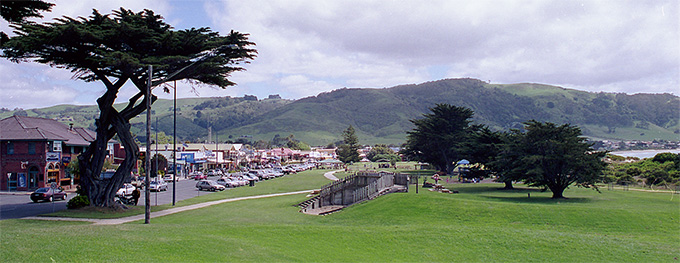The Great Ocean Road
The isolated coastal settlements at Apollo Bay and Lorne both became established as a result of the safe haven their harbours offered passing ships, and other than a winding dirt track along the coast, both towns were only accessible by sea. When the railway was opened to Winchelsea in 1876, Lorne could be reached from there by coach.
Although proposals for an ocean road were mooted as early as the 1880s, it was not until the formation of the Country Roads Board in 1912 and the Great Ocean Road Trust in 1918 that the concept started to become a reality. Construction gave employment to thousands of soldiers returned from World War I and was almost entirely carried out with picks, shovels and crow bars. Lorne was reached by 1922 and the entire road to Apollo Bay opened in 1932.

Johanna Beach.
The road which continues inland through the Otway Ranges was only sealed and straightened in the 1980s. It then follows the coastline through Port Campbell National Park, passing the well-known coastal landscape of the Twelve Apostles, part of the rugged and spectacular coastline which justifiably wears the name ‘The Shipwreck Coast’.

The Twelve Apostles, in the Port Campbell National Park.
The Great Ocean Walk
The Great Ocean Walk is a 91 km walking track launched in January 2006 which runs from Apollo Bay to Glenample Homestead, adjacent to the Twelve Apostles passing through the Great Otway and Port Campbell National Parks.
Visitors can camp in seven purpose-built ‘hike-in’ campsites or select from a variety of off-park accommodation including privately operated camping grounds, bed and breakfasts and self-contained cottages.
Apollo Bay

Apollo Bay as it is today.
First European settlement in Apollo Bay occurred in the 1840s when the Henty
Brothers established a whaling station on Point Bunbury, site of today’s
nine-hole golf course. Timber cutters soon followed and settled. Named after
a visiting schooner, the town was known as Middleton and Kambruk until finally
becoming Apollo Bay in 1952.
In 1932 the coastal steamer Casino sank at the town’s jetty with ten lives lost.
Access was mostly by sea until the Great Ocean Road was completed in that same
year, allowing the township to develop into the holiday destination it is today.
The fresh catch of Apollo Bay’s fishing fleet, including cray, shark, whiting, flathead and snapper, may be bought at the Fishermen’s Co-op. Numerous restaurants and food outlets offer fine seafood and other delights.
Attractions include spectacular lookouts, the Old Cable Station Museum, the Bass Strait Shell Museum and glow worm tours. Local arts, crafts and produce may be found at the Community Market on the foreshore each Saturday and from several galleries, while the annual Music Festival caters for many tastes in a festive atmosphere. The Great Ocean Road Information Centre on the foreshore offers inspiration on activities in Apollo Bay.